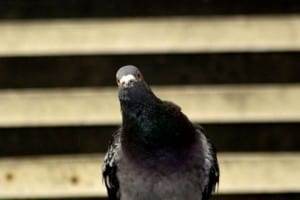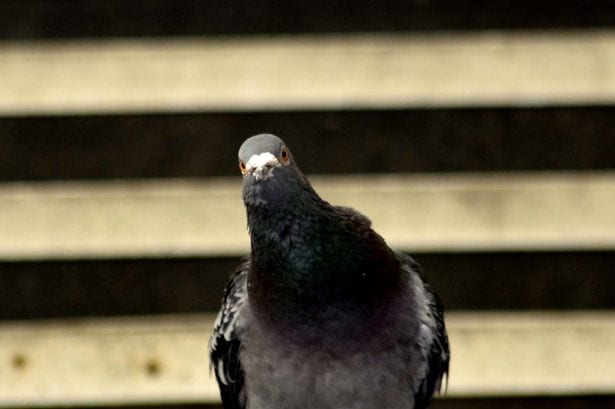In 2019, not long before the unusual weather event that changed day into night in São Paulo City (Brazil), dozens of pigeons mysteriously dropped dead. Birds displaying wounds as well as neurological symptoms were found dead or dying near the municipal animal disease control center.
A multicenter research team discovered that the deaths were unrelated to the pollution blown into the city from forest fires in the Amazon, despite the proximity of the dates, but were in fact due to Newcastle disease virus (NDV), a serotype 1 avian paramyxovirus. The cases in question were caused by subgenotype VI.2.1.2, which is almost always deadly for pigeons. Also known as pigeon paramyxovirus (PPMV), this pathogen only rarely infects humans when transmitted by close contact with infected birds.
“We discovered that this virus has been circulating silently in Brazil since 2014. Our analysis of molecular data showed that it’s the same PPMV that had been identified five years before in Porto Alegre [the capital of Rio Grande do Sul state]. São Paulo and Porto Alegre are 1,100 km apart, which only goes to show how much the disease can spread without being noticed,” said Luciano Matsumiya Thomazelli, first author of an article on the team’s findings published in the journal Viruses. Thomazelli is affiliated with the University of São Paulo’s Biomedical Sciences Institute (ICB-USP), where he works at the Clinical and Molecular Virology Laboratory.
Since 2005, a team from the laboratory has conducted epidemiological surveillance in various parts of Brazil, under the aegis of the Virus Genetic Diversity Network (VGDN), which is funded by FAPESP and coordinated by Professor Edison Luiz Durigon, last author of the article.
The group also works with the Network for Surveillance of Viruses in Wild Animals (PREVIR), funded by the National Council for Scientific and Technological Development (CNPq), an arm of the Brazilian government’s Ministry for Science, Technology and Innovation (MCTI).

Deadly to pigeons
NDV normally causes disease in hens and chickens but not in pigeons. According to the researchers, however, the opposite occurs with subgenotype VI.2.1.2.
“It’s endemic in pigeon populations worldwide, causing neurological symptoms and high mortality rates. Cases are frequently reported in Asia, Europe and North America. Although this is the second reported outbreak in Brazil, there are no grounds for alarm because this subgenotype isn’t a significant threat to humans or poultry farmers,” said Helena Ferreira, a professor at the School of Animal Sciences and Food Engineering in Pirassununga (FZEA-USP), a member of PREVIR-MCTI, and principal investigator for the study.
The researchers stressed the importance of active surveillance and monitoring to control outbreaks and epidemics, and to provide early warning of the emergence of new diseases.
“Active surveillance throughout Brazil is vital to control pigeon populations near poultry farms and in urban areas,” Thomazelli said. “Monitoring of NDV is also important from the economic standpoint, as Brazil is the world’s leading exporter of frozen chicken.”
Before the researchers could identify the disease that was killing feral pigeons (Columba livia) in São Paulo, the animal disease control center and official veterinary service collected and organized several specimens of dead birds.
“Initially the cause of death was thought to be a bacterium, but no pathogenic species were identified,” Ferreira said. “They sent samples to ICB-USP and the Federal Agricultural Defense Laboratory [LFDA-SP], where characterization was performed, in line with the standard procedure for notifiable viral diseases affecting poultry. Our lab in Pirassununga then sequenced the viral genome.”
Her team also performed analyses to identify tissue wounds. “We sequenced the whole genome and identified the virus as VI.2.1.2,” she said. “This enables us to conduct an in-depth investigation, compare the outbreak with others elsewhere in the world, track the pathogen’s evolution in Brazil, and predict its behavior from now on, including whether it may adapt to other feral birds, for example.”
The genomic analysis showed that the virus found in São Paulo and Rio Grande do Sul (in 2014) can be grouped with samples from Africa.
“Other cases need to be identified so that we can propose classification of the genotype that has circulated in Brazil. It’s relatively different from the African one,” she said. “This kind of monitoring is most important. In the specific case in question, the genotype can’t infect domestic birds [hens] efficiently. If a hen is infected, it doesn’t transmit the virus to others in the same flock. However, studies have suggested that this genotype can adapt in hens over time and cause disease in other domestic birds. Even so, it isn’t considered very dangerous for commercial poultry.”
Pigeon Patrol Products & Services is the leading manufacturer and distributor or bird deterrent (control) products in Canada. Pigeon Patrol products have solved pest bird problems in industrial, commercial, and residential settings since 2000, by using safe and humane bird
deterrents with only bird and animal friendly solutions. At Pigeon Patrol, we manufacture and offer a variety of bird deterrents, ranging from Ultra-flex Bird Spikes with UV protection, Bird Netting, 4-S Bird Gel and the best Ultrasonic and audible sound devices on the market today.
Voted Best Canadian wholesaler for Bird Deterrent products ten years in a row.
Contact us at 1 877-4-NO-BIRD,(604) 585-9279 or visit our website at www.pigeonpatrol.ca
Pigeon/Pigeon Patrol / Pigeons Roosing / Vancouver Pigeon Control / Bird Spikes / Bird Control / Bird Deterrent / PIgeon Deterrent / Surrey Pigeon Control / Pest / Seagull deterrent / Vancouver Pigeon Blog / Birds Inside Home / Pigeons in the cities / Ice Pigeons / What to do about pigeons / sparrows, Damage by Sparrows, How to Keep Raccoons Away, Why Are Raccoons Considered Pests / De-fence / Pigeon Nesting / Bird Droppings / Pigeon Dropping / woodpecker control / Professional Bird Control Company / Keep The Birds Away / Birds/rats/seagull/pigeon/woodpecker/dove/sparrow/pidgeon control/pidgeon problem/pidgeon control/flying rats/pigeon problems/ bird netting/bird gel/bird spray/bird nails/bird guard

